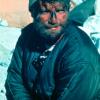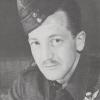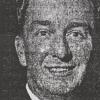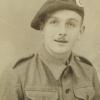“In September 1944 we were in Nissen huts in the village of BURFORD and flew to ARNHEM from BROADWELL aerodrome. We left on the Sunday morning and our Horsa glider carried our jeep, 6-pounder anti-tank gun plus all our shells and small arms ammunition. The jeep contained our picks, shovels, camouflage nets, petrol cans, water buckets and the 101 other items needed in action. As you can see, a heavy load indeed! Travelling in the glider were our commander, Sgt Molloy, driver George Haskins and myself. We all sat at the back facing the nose of the glider.The jeep and gun were securely chained to the floor and the chains had quick release shackles.
When loading the glider the jeep was driven up the ramp to the entrance in the side. It was then manhandled round and pushed forward to the main bulkhead where the steering wheel was removed. This was held in place by a large butterfly nut, the wheel being replaced once the jeep moved forward. The gun was then pushed up the ramp to the flat surface at the top where it was turned round so that the barrel faced the glider. The rest of the gun crew jumped on the barrel to take the weight off the legs so that Danny Farrell and I could remove the two locking bolts and split the legs. With the legs attached to the gun it was too long to get into the glider. We then turned the gun again and manhandled it into the glider. Once inside the legs were re-fixed and the gun hitched to the back of the jeep.
Our gun crew consisted of Danny Farrell (No 1) who fired the gun, myself (No 2) who loaded the gun, Gordon Ennion (No 3) who passed me the shells, Bill Grundy (No 4 ) being responsible for bringing the shells and manning our Bren gun, Sgt Johnny Molloy being our gun commander, who trained us and switched us around so that we could all do each others duties if needed.
When we landed at Arnhem my first job was to climb on to the roof of the glider and fix a coloured flag so that the rest of the gun crew knew where to find us. Then we removed the gliders tail, which was held on by four metal bolts – I think we had to use an axe to finally free the tail. We carried two steel ramps with us and once they were hooked into position George was able to drive the gun off the glider. Then it was all aboard and over the railway lines to our rendezvous.
We passed a lot of men and women who obviously had got out of the nearby Mental Institution. Our first task was guarding the landing area for the second lift and then we moved around quite a bit. Whilst on the move we were attacked by German fighter aircraft and I jumped into a ditch for cover. Sheltering there was a fellow Scot, Jake Turner (a brilliant pianist who played in the battalion dance band), who was sure he was not going to make it and he persuaded me to take a letter for his girl-friend who was a W.A.A.F. at Coningsby. Why he thought I would make it I don’t know. As it turned out he was taken prisoner and eventually I was able to deliver his letter. Even now I don’t know if Jake ever made it back from Germany.
We dug-in near the crossroads, VAN BORSSELENWEG and UTRECHTSEWEG. On the Wednesday morning [20th September 1944] we received a heavy mortar attack and Sgt French’s gun, which was near us, received a hit. Jimmy Wells was killed, Sgt French wounded in the head and their driver, ‘Jock’ McKinley wounded in the legs. Jimmy was buried in a nearby slit trench and ‘Jock’ carried into a local house. I’m not sure what happened to Sgt French. As there were quite a number of wounded our driver, George, was used to ferry them to the nearest Aid Post, which I believe was the Hartenstein Hotel. We never saw him again and he was eventually taken prisoner. Our gun crew were used to make up ‘C’ Company casualties, but kept near the gun, which was never fired.
Later, when we were in Germany, after the war I went back to Oosterbeek, but there was no trace of either gun. For the first couple of days we saw quite a number of Dutch civilians, but from Wednesday onwards they wisely stayed in their cellars. I can remember Major Breese coming to our slit trench and detailing ‘Larry’ Large and myself to escort him to a large farm building somewhere near the river. There was a big concrete yard full of oval holes and I thought ‘my God, if the Germans open up with their mortars now it will be a sheer massacre’. However, once Major Breese was ready it was back to ‘C’ Company again. What sticks in my mind is the terrific noise which never stopped.
The surrounding trees were stripped bare with the amount of shrapnel which flew around. To begin with we carried our wounded to the Hartenstein and another house, but by the end of the week our medical orderlies had a very tough time. There was no way of getting the severely wounded to hospital and medical drugs were very scarce. Food, water and ammunition was also scarce, but we were full of admiration for the R.A.F. in their gallant efforts to keep us supplied. Unfortunately most of it landed in German hands.
I can remember there was a well somewhere at the back of the Hartenstein where we could go for water, but you had to be very careful as it was covered by snipers. On the Monday night an officer came round the slit trenches telling us we were pulling out after it got dark, but to keep firing as long as possible. When we did move out it was just a case of following the chap in front. The weather was terrible, which made the going rougher still. Getting near the river I could see a long queue which I joined and I got ferried across by the Royal Engineers just before daybreak.
Once over the river I was guided to a building where I was given some rum, then taken by D.U.K.W. to a school in NIJMEGEN. Here we were given a hot meal and a complete change of clothing. During the battle I had kept my Red Beret tucked inside my tunic and I still wear it [on the commemorations]. After a couple of days we were taken to LOUVAIN in BELGIUM. From there to BRUSSELS airport for our flight back to England. On our first flight we had to turn back because of fog, I think we flew in a Dakota.
Back in England we returned to our old billets in Woodhall Spa. Here we were warned not to speak about the battle, especially to the relatives of those who were missing. The local people were very good and gave us a smashing party in one of the big hotels. Then we were given 14 days leave and the first part of it I spent in Manchester with the parents of one of my pals, who was missing. Glad to say he was a prisoner and survived the war”.





Latest Comments
There are currently no comments for this content.
Add Comment
In order to add comments you must be registered with ParaData.
If you are currently a ParaData member please login.
If you are not currently a ParaData member but wish to get involved please register.